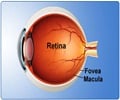Researchers from Massachusetts General Hospital (MGH) have successfully restored vision in mice with retinal degeneration, using gene therapy - a development that could lead to blindness cure.
In a development that could lead to blindness cure, researchers from Massachusetts General Hospital (MGH) have successfully restored vision in mice with retinal degeneration, using gene therapy.
The team was able to restore useful vision to mice with degeneration of the light-sensing retinal rods and cones, a common cause of human blindness, thus building hope that the technique may someday treat retinitis pigmentosa and macular degeneration."This is a proof of principle that someday we may be able to repair blindness in people with conditions like retinitis pigmentosa and macular degeneration," said Richard Masland, PhD, director of the Cellular Neurobiology Laboratory in the MGH Department of Neurosurgery.
"There are several limitations we need to overcome before we can begin clinical trials, but I'm optimistic that this work may someday make a big difference for people who otherwise would have no vision at all," he added.
For the study the researchers examined the effect of expressing the light-sensitive protein melanopsin in retinal ganglion cells.
These specialized neurons receive light signals from the rods and cones and carry those signals into the brain via the optic nerve
The team used the standard viral vector adeno-associated virus to deliver the gene encoding melanopsin throughout the retinas of mice whose rod and cone photoreceptors had degenerated from lack of a crucial protein.
Advertisement
Further analysis of revealed that all melanopsin-expressing cells responded to light.
Advertisement
"The same level of melanopsin expression in a human retina might allow someone who otherwise would be totally blind to read newspaper headlines, but the slowness of the response would be a problem," said Masland.
The report appears in the Proceedings of the National Academy of Sciences.
Source-ANI
RAS/SK















